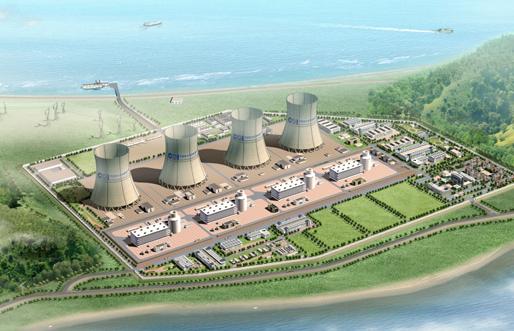
(Ecns.cn) – China suspended approvals of all new nuclear plants following the Fukushima accident in March of 2011. But as the government gears up to resume construction, residents of Wangjiang County in Jiangsu Province have become worried again that a nuclear power project is too close to home.
On Feb. 7, 2012, the Wangjiang government issued a document requiring the cessation of construction of a nuclear plant in Pengze, located on the opposite shore of the Yangtze River. Construction of the plant had begun about two years ago, but was suspended by the State Council after the Fukushima meltdowns.
From the day the locals became aware of the plant, sharpened vigilance has gradually turned into fear, and residents of Wangjiang say they will never agree to the nuclear power project, according to China Economic Weekly.
'Not in my backyard'
Along with China's rapid economic development, the "Not in My Backyard" (NIMBY) syndrome has become increasingly prevalent. And for residents of Wangjiang County, the accident at the Fukushima No. 1 nuclear power plant has been a wake-up call to the dangers of atomic energy.
Since June of 2011, Wang Jinzhou, former deputy party secretary and CPPCC chairman of Wangjiang, has called for related departments to stop construction of the Pengze nuclear power plant.
According to Wang, there were multiple problems concerning location selection and environmental assessment for the plant. Moreover, the project's planning included falsified population data, errant earthquake standards and bogus public opinion polls.
Wang is also angry that the establishment of the Pengze nuclear plant was not subject to the approval of Wangjiang because it is located across the river, yet its residents would be among the first affected if an accident occurs.
Wang's plan involves a three-step strategy to solve the problem – demanding official opposition, seeking media support and taking legal action. Currently they are at the second phase, he said.
Before exposing the case to the mass media, Wang and three other retired village officials submitted copies of a petition to the local government and the Anhui and Jiangxi provincial governments seeking suspension of the plant's construction.
With the government of Wangjiang County showing support, the petition was uploaded to the Internet on Dec. 20, 2011, but drew nationwide attention from media only after it was reposted thousands of times on microblogs in February, noted the China Economic Weekly.
A tale of two villages
Mopan is a small village in Wangjiang County on the banks of the Yangtze; across the river is Huxi Village in neighboring Jiangxi Province. In the past, the two villages have maintained steady economic cooperation.
Han Zhengfa is party secretary of Mopan, and has developed a close friendship with his counterpart in Huxi. In 2006, when Han was asked about a planned public opinion poll in his village, he agreed without a second thought.
A few days later, villagers gathered in Mopan and were ordered to fill out questionnaires concerning the construction of a new nuclear power plant in Huxi. Those who showed a cooperative attitude received a free package of detergent powder and a bottle of liquid kitchen cleanser, reported the China Economic Weekly.
However, villagers such as Hong Zengzhi were furious – the minute he saw the questionnaire he tore it up. After that, the villagers were frequently harassed, which appeared to be revenge from local government officials, said Hong.
But when the Fukushima accident occurred, Han Zhengfa came to understand suddenly that the planned nuclear power plant was not to be taken lightly, since it posed many risks to the development of the village and the people living along the Yangtze River.
Officials from Mopan then began to oppose the project and called for its cancellation. Local villagers also said they had no plans to relocate.
Uncertain future
Five days after the Fukushima accident, China suspended approvals for new nuclear power plants and demanded related departments to recheck safety standards. Workers at the Pengze nuclear power plant were therefore withdrawn.
More than a year ago, the local government planned to build a new town around the plant with an estimated population of 50,000, as it believed the nuclear power industry would boost the local economy.
The plant was also supposed to ease Jiangxi Province's power demands, since up to 70 percent of its thermal coal is imported from other provinces. Nevertheless, the Pengze nuclear power plant continues to wait, and its destiny remains uncertain.

Copyright ©1999-2011 Chinanews.com. All rights reserved.
Reproduction in whole or in part without permission is prohibited.